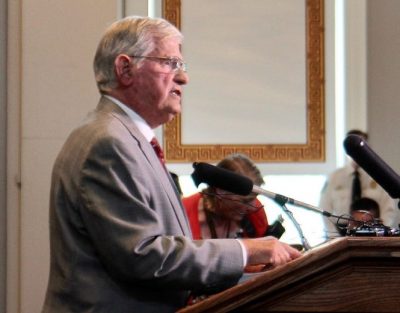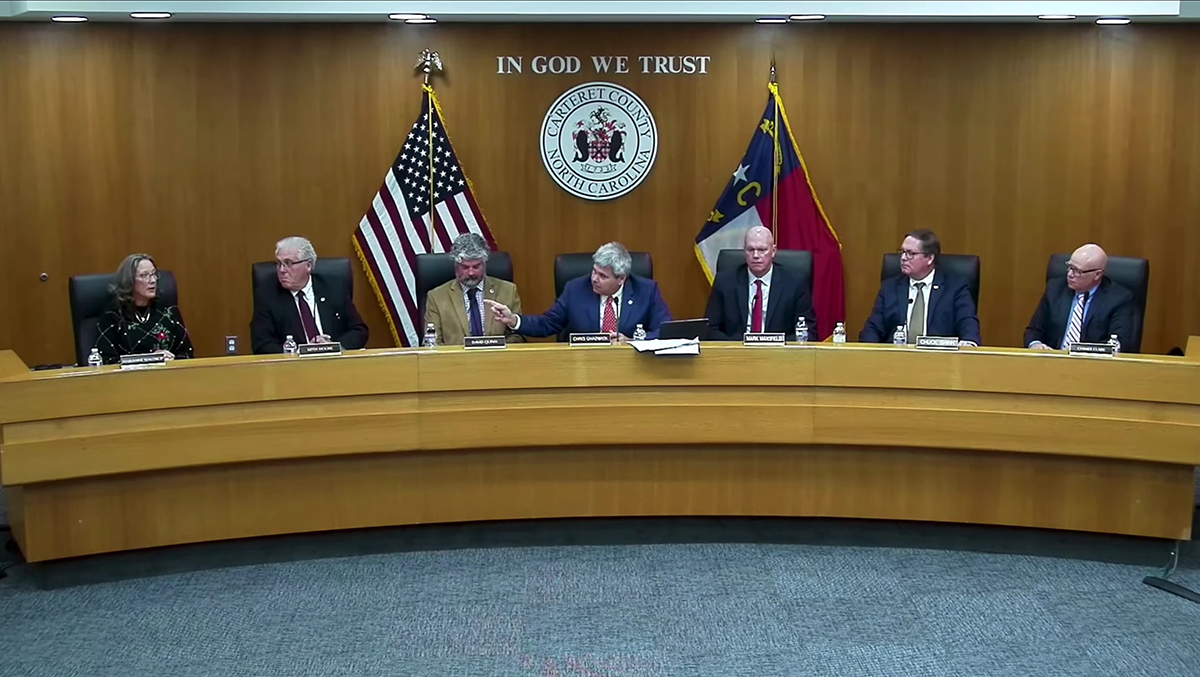
RALEIGH – With a deadline for printing ballots for the 2018 elections fast approaching, court challenges and high-level opposition are putting a focus on proposed constitutional amendments that could shift a considerable amount of power from the Office of Governor to the North Carolina General Assembly.
During a joint press conference Monday at the North Carolina State Capitol, the state’s five living former governors, two Republicans and three Democrats, came out strongly against two amendments they say would undermine the power of the executive branch.
Supporter Spotlight
The unprecedented rebuke of the legislature’s moves comes as legal efforts against the amendments continue.
Last week, the Southern Environmental Law Center joined the legal fight against the amendments, filing a case on behalf of Clean Air North Carolina and the state NAACP that challenges four of the six proposed amendments.
The General Assembly passed the amendments during the last week of June at the end of this year’s short session. Legislators returned last month to write the ballot language for the amendments and returned again a week later to overturn Gov. Roy Cooper’s veto of those bills.
Cooper launched his own legal battle against the amendments shortly after they were approved by the legislature. Bills relating to constitutional amendments are one of the categories of legislation not subject to a gubernatorial veto.
The five former governors late Tuesday filed an amicus brief joining Cooper’s lawsuit against the legislature.
Supporter Spotlight
In an interview Tuesday with Coastal Review Online, Kym Hunter, the Southern Environmental Law Center’s lead attorney for the case, said she expected a ruling on a temporary restraining order as early as Wednesday. Legislative leaders challenged the plaintiffs’ standing, and plaintiffs responded that lawmakers misstated key facts. A three-judge panel is scheduled to hold its first hearing in the case at 9:30 a.m. Wednesday in Wake County Superior Court.
Hunter said that, of the four amendments, the greatest potential impact for the state’s environment could come from passage of an amendment that would give the legislature sole authority to appoint members of state boards and commissions, including those with direct authority over implementing environmental policy and rule-making.
In the lawsuit, nonprofit Clean Air North Carolina joined with the NAACP to also fight a proposed voter ID amendment that will allow the legislature greater authority in drafting new voter ID laws to replace one that was struck down as unconstitutional after a federal appeals court ruled it targeted African-American voters.
Hunter said that while it may not seem like an environmental issue, the disproportionate effects on African-Americans in environmental disasters and, as the recent industrial hog farm cases illustrated, disproportional impact in dealing with day-to-day pollution make fair representation a priority.
“It’s really important that everyone in this state gets a vote,” Hunter said. “It’s important that our state representatives are representing all the people.”
The lawsuit also challenges a proposed amendment for a tax cap that could limit the state’s response to environmental challenges, she said. And a judicial appointments amendment would give the legislature control over candidates to fill judicial vacancies, a change Hunter said threatens judicial branch independence.
“Environmental groups use the court system to challenge things like illegally issued permits. It’s really important that we have an independent judiciary,” Hunter said. “We’re concerned about that shift in power.”
The proposed amendment also contains a section that Hunter and others say could allow for a judicial appointments bill, which also cannot be vetoed, to become a vehicle for other legislation that would otherwise be rejected by the governor.
Hunter said while she expected a ruling soon on the temporary restraining order, the case will likely be appealed regardless of the outcome. But time is running short to finalize the fall ballot.
State Board of Elections and Ethics Enforcement officials said the board will need to send ballot data to vendors on Friday to meet a deadline to have absentee ballots ready by Sept. 7, or 60 days before the election, as required by law.
Patrick Gannon, public information officer for the state board, said the court can reduce that threshold to 45 days before the election, but that absentee by-mail ballots must be available by Sept. 22 under federal law. Early voting starts Oct. 17 and Election Day is Nov. 6.
The legislature is scheduled to return Nov. 26 to take up enabling legislation for any constitutional amendments approved by the voters.
Governors versus Legislators
The current lawsuits are just a precursor to what will come if the two amendments aimed at the powers of the governor pass, according to former Gov. Jim Martin, a Republican who served in the office from 1985 to 1993.

During a Monday press conference from the well of the House at the old State Capitol, Martin said the language of the amendments is so unclear that it would trigger litigation that could hamstring state government for years.
Martin said that, as evidenced by the unprecedented solidarity of the five former governors, the issue is not a partisan one. “You see, this is not about partisan politics, this is about power politics,” he said, “and it must be stopped.”
Martin said the amendments would interfere with both the constitution’s requirement for separation of powers as well as the governor’s role to faithfully execute the laws. He called the language in the judicial appointments amendment that could be used to avoid a veto for other matters a “trojan horse” and said that, far from clarifying the definitions of the amendments for the ballot, the recent ballot language bills passed by the legislature did more to obscure the real intent.
Martin was joined by former Govs. Mike Easley, Jim Hunt, Pat McCrory and Beverly Perdue, who all roundly criticized the effort as a legislative power grab.
McCrory, who had successfully sued legislative leaders over appointments legislation during his 2013-17 term, called the amendments “deceitful and misleading.”

Easley, who served as governor from 2001 to 2009, said boards and commissions such as the Coastal Resources Commission were part of the executive branch and shouldn’t be under control of the legislature.
“I think it’s important to understand that the power of the executive is in those boards and commissions,” Easley said. “That’s where you get your permits. That’s where you get your regulations.”
Legislative leaders pushed back against the former governors. House and Senate elections committee chairs Rep. David Lewis, R-Harnett, and Sen. Ralph Hise, R-Mitchell, sent out a scathing email titled “Greatest Hits on Ethics and Appointments From Previous Governors” that detailed “Just how far off the rails North Carolina’s governors went without a balanced, bipartisan elections and ethics enforcement board and a merit-based judicial selection process.”
A joint statement following the press conference from House Speaker Tim Moore and Senate leader Phil Berger read: “While it’s not surprising former governors oppose checks and balances on the unilateral authority of their office, we are confident the people will support a more accountable approach to filling judicial vacancies and approve a bipartisan balance on critical boards like the state’s ethics and elections commission over a system of purely political control.”
If Amendments Pass, Then What?
Robin Smith, a former state assistant environmental secretary and a recent Cooper appointee to the Coastal Resources Commission, said what’s being contemplated would be a significant change in the balance of power in the state.
In an interview Tuesday, Smith said she agreed with former Gov. Martin’s assessment that the amendments would interfere with the governor’s ability to do the job the constitution requires.
“It’s the governor’s duty to make sure the laws are faithfully executed, and the governor can’t do that if he has no control either over either the appointment of those commission members or their removal,” said Smith.
“It’s the governor’s duty to make sure the laws are faithfully executed, and the governor can’t do that if he has no control either over either the appointment of those commission members or their removal.”
Robin Smith, former assistant environmental secretary, Coastal Resources Commission appointee
She said it would be hard to predict how commissions made up of legislative appointees would interact with their respective departments, which are under the governor’s control.
“It’s certainly sets up a political division that doesn’t exist in quite this way now,” she said. “If they were all legislative appointees they would presumably be more responsive to legislative concerns versus the staff.”
Smith said legislators have always had the ability to amend statutes if they disagree with how a department or commission interprets policy or carries out the laws, but it’s unclear how having more direct control over the rule-making boards will play out.
“I’m not sure anyone really knows exactly what it would look like because we’ve never done this before.”
Smith said she expected more litigation, should the amendments pass, saying there would likely be action around conflicts among various sections of the constitution.
The amendment asserting legislative control over appointments powers doesn’t necessarily mean it will happen, she said, given that it only adds language to the constitution’s separation of powers section and doesn’t eliminate it.
“It’s not clear to me that this amendment would even resolve that issue, because the language is still going to be in the constitution that talks about executive, legislative and judicial powers being fully separate, she said. “(The legislature’s) intent is likely for that new language to mean they can appoint all or a majority of the members, but I think that’s going to set up another round of litigation over whether in fact that language can do that given the requirement for separation of powers and the governor’s duty for the laws to be faithfully executed.”
Smith said that should the amendments pass, the required enabling legislation could also face legal challenges.
“Constitutional amendments don’t just limit state agencies, they limit the legislature’s authority, too,” Smith said. “So, you’re going to have to look at that enabling legislation with an eye toward whether it’s truly consistent with not just amendments but the constitution as a whole.”








